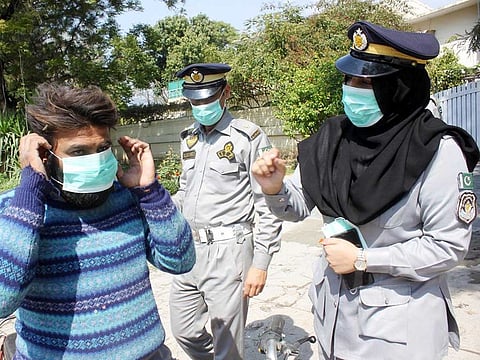Pakistan health minister cautions against use of specific medicines for Covid-19 treatment
Country has seen a surge in demand for anti-malarial drug hydroxychloroquine

Islamabad: After reports of increased use of several medicines, including chloroquine, and pharmacies running out the stock, Pakistan’s Health Minister, Dr Zafar Mirza, has warned the people not to use unauthorised drugs as prevention or cure for coronavirus.
“Some local doctors are recommending use of specific medicines for prevention of Covid-19” but it is “not right” Dr Mirza tweeted. “There is no evidence that current medicine can prevent or cure the disease. WHO does not recommend any medicine as a prevention or cure for Covid-19,” he added.
People have been taking hydroxychloroquine, also known as chloroquine, for decades to prevent and treat malaria but the pharmacies in Pakistan’s major cities have recently seen a surge in demand for the medicine.
“We are out of stock for over a week,” Mohammad Rizwan an Islamabad-based pharmacist, told Gulf News. “Doctors are not recommending it. People are usually coming without prescriptions looking for chloroquine after the social media posts and WhatsApp messages claimed that it was effective in treating patients with coronavirus symptoms,” the pharmacist at Sky Medical store said.
Common malaria treatments
The demand for the drug sparked overdose and hoarding globally after the United States President Donald Trump recently claimed the common malaria treatments hydroxychloroquine and chloroquine as potential remedies for coronavirus disease.
Meanwhile, Pakistan’s drug regulatory authority has also issued a notification, banning the sale of chloroquine medicines without a prescription. It also directed that these medicines be sold only by licenced pharmacies and drug stores. The drug stores have been instructed to keep records of all prescriptions as well. The Drug Regulatory Authority of Pakistan (Drap) further stated that it has been observed that some people are hoarding the stocks of anti-malarial drug.
According to the World Health Organisation (WHO), “there is no specific medicine recommended to prevent or treat the new coronavirus” to date. Some specific treatments are under investigation, and will be tested through clinical trials, WHO said.
Sign up for the Daily Briefing
Get the latest news and updates straight to your inbox



